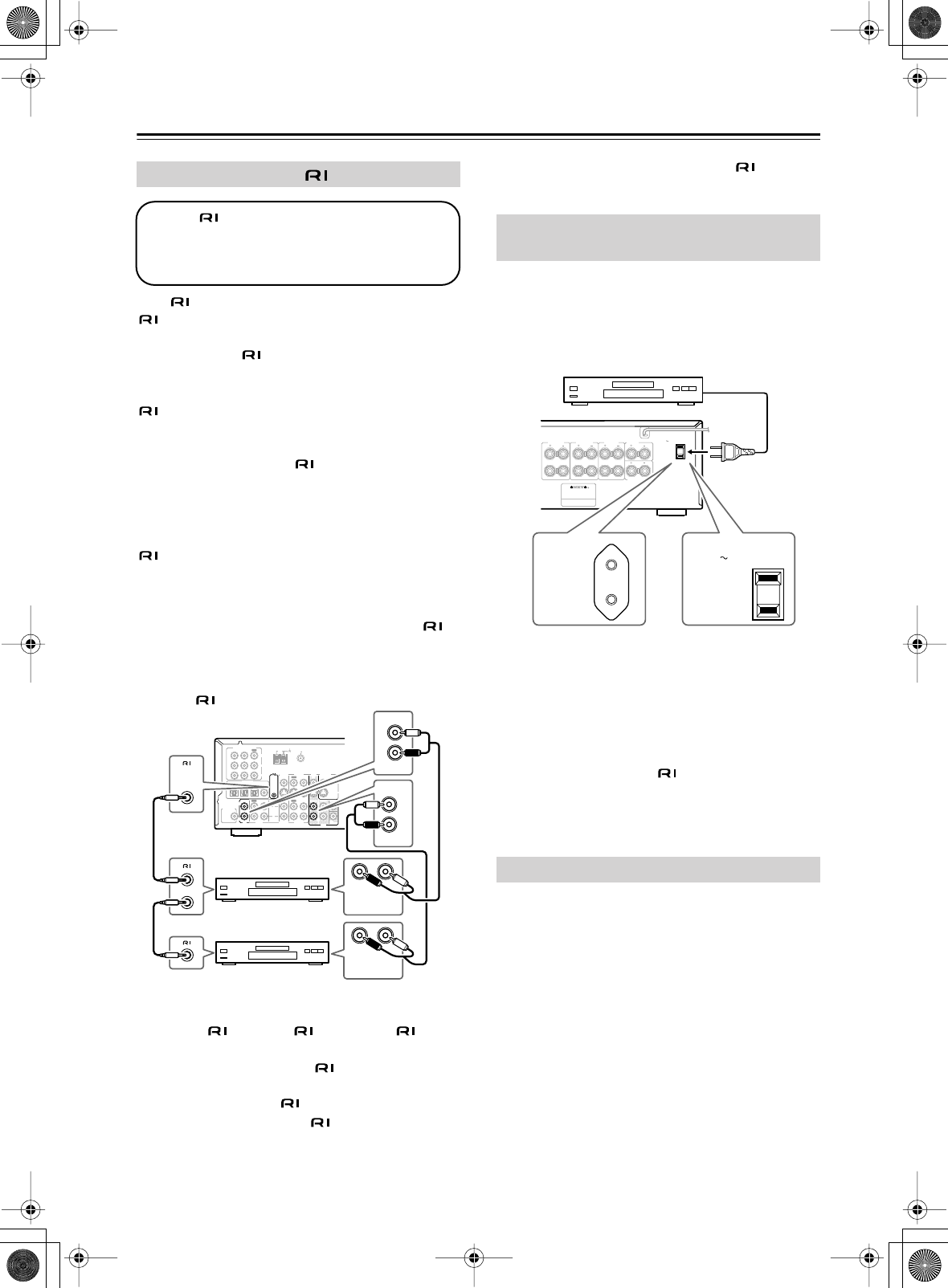
30
Connecting the AV Receiver
—Continued
With (Remote Interactive) you can control your
-compatible Onkyo CD player, DVD player, and so
on with the AV Receiver’s remote controller, and use the
following special functions:
Auto Power On/Standby
When you start playback on a component connected via
, if the AV Receiver is in Standby, it will turn on and
select that component as the input source automatically.
Similarly, when the AV Receiver is set to Standby, all
components connected via also enter Standby. This
function will not work if the component’s power cord is
connected to the AV Receiver’s AC OUTLET.
Direct Change
When playback is started on a component connected via
, the AV Receiver automatically selects that compo-
nent as the input source. If your DVD player is con-
nected to the AV Receiver’s multichannel input, you
must press the [MULTI CH] button to enjoy all channels
(see page 35). This is because the Direct Change
function only selects the FRONT DVD IN sockets.
Remote Control
You can use the AV Receiver’s remote controller to con-
trol other -compatible Onkyo components.
Notes:
• Push plugs in all the way to make good connections.
• Use only cables for connections. cables
are supplied with Onkyo players (DVD, CD, etc.).
• Some components have two sockets, you can con-
nect either one to the AV Receiver. The other is for
connecting additional -compatible components.
• Connect the AV Receiver’s socket to only Onkyo
components. Connecting to other manufacturer’s
components may cause them to malfunction.
• Some components may not support all functions.
Refer to the manuals supplied with your components.
The AV Receiver has AC outlet on its rear panel for con-
necting the power cord of another AV component. The
other component’s power switch can be left in the ON
position so that it turns on or off when the AV Receiver
is set to On or Standby.
Caution:
• Make sure that the capacity of the component that you
connect to the AC OUTLET does not exceed the stated
capacity (e.g., 100 W).
Note:
• Onkyo components with sockets should be con-
nected to regular wall outlets.
• The connector type and capacity will depend on the
country in which you purchased the AV Receiver.
Notes:
• Before connecting the power cord, connect all of
your speakers and AV components.
•Turning on the AV Receiver may cause a momentary
power surge that might interfere with other electrical
equipment on the same circuit. If this is a problem,
plug the AV Receiver into a different branch circuit.
Connecting Onkyo Components
To use , you must make an analog audio
connection (RCA) between the AV Receiver
and the other component, even if they are con-
nected digitally.
L
R
ANTENNA
FM
75
AM
OPTICAL COAXIAL
123
DIGITAL
IN
REMOTE
CONTROL
IN
IN
IN
IN
IN IN
IN
IN
FRONT
SURR
CENTER
SUB
WOOFER
OUT
OUT
OUT
VIDEO 2
VIDEO 1
DVD MONITOR
OUT
VIDEO
S VIDEO
DVD
TAPE
CD
L
R
VIDEO 2
VIDEO 1
SUBWOOFER
PRE OUT
VIDEO 1
/2/3IN
DVD
IN
COMPONENT VIDEO
Y
P
B
PR
OUT
L
R
LR
FRONT
DVD
L
R
IN
CD
L
R
REMOTE
CONTROL
ANALOG
AUDIO OUT
LR
ANALOG
AUDIO OUT
e.g., CD player
e.g., DVD player
Connecting the Power Cords of Other
Components
Connecting the Power Cord
AC OUTLET
AC 120
V 60
Hz
SWITCHED
120
W 1
A
MAX.
R
L
R
L
FRONT
SPEAKERS A
SURROUND
SPEAKERS
CENTER
SPEAKER
SURROUND BACK
SPEAKER
R
L
FRONT
SPEAKERS B
Class 2 Wiring
AC OUTLET
AC 120
V 60
Hz
SWITCHED
120
W 1
A
MAX.
SWITCHED
100W MAX.
AC OUTLET
European and some
Asian models
American model


















